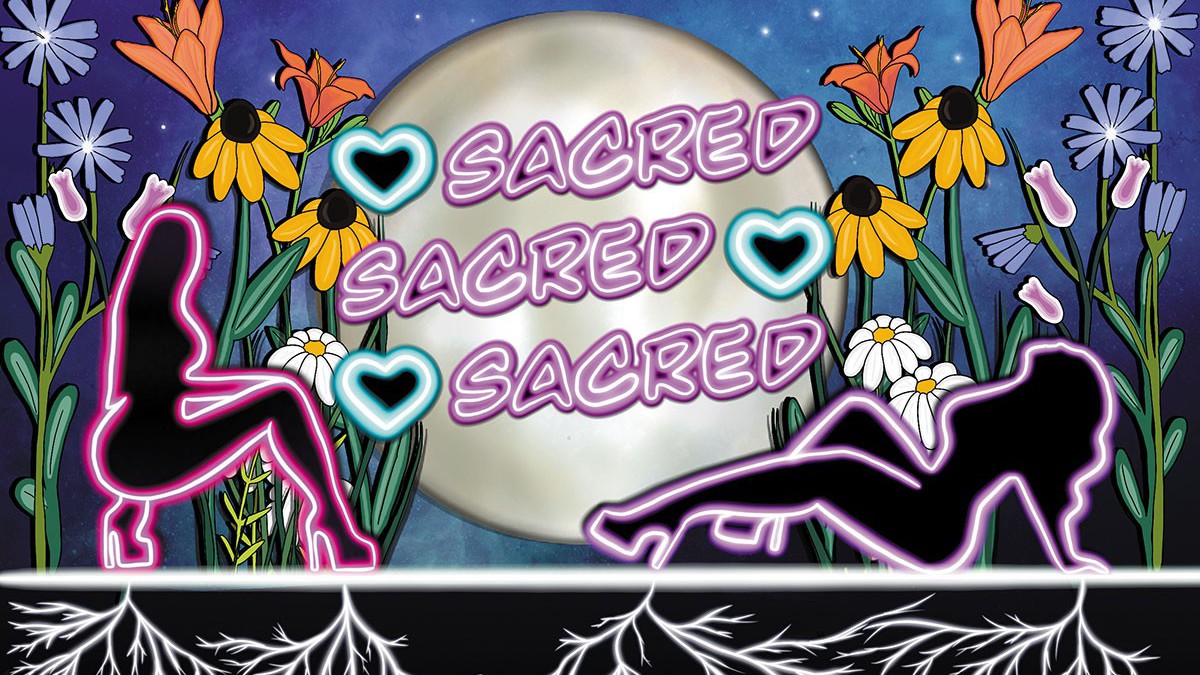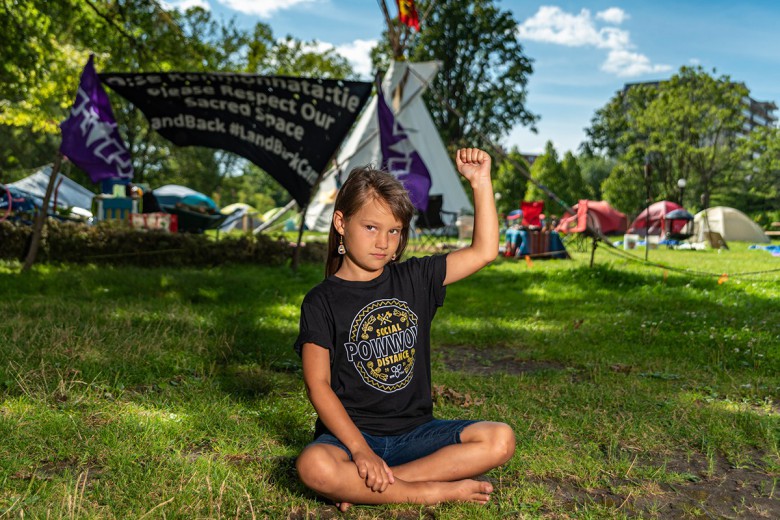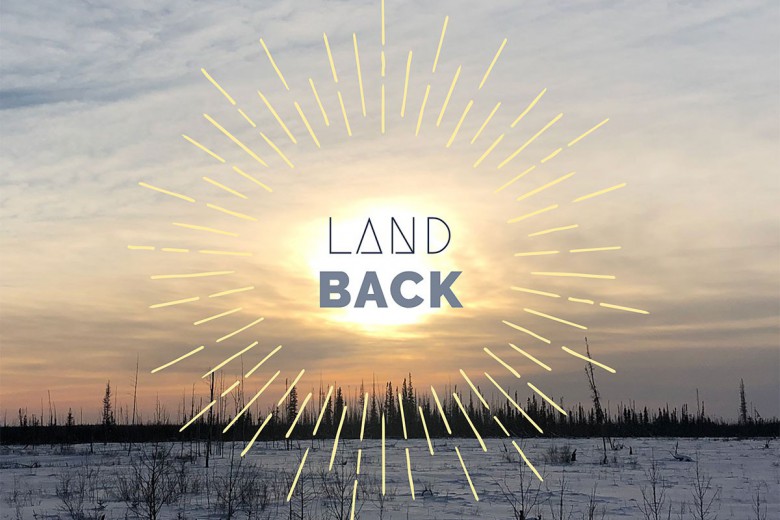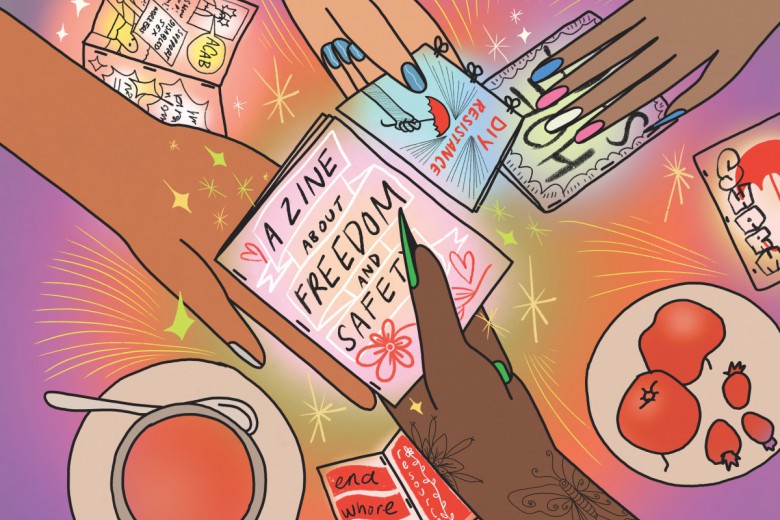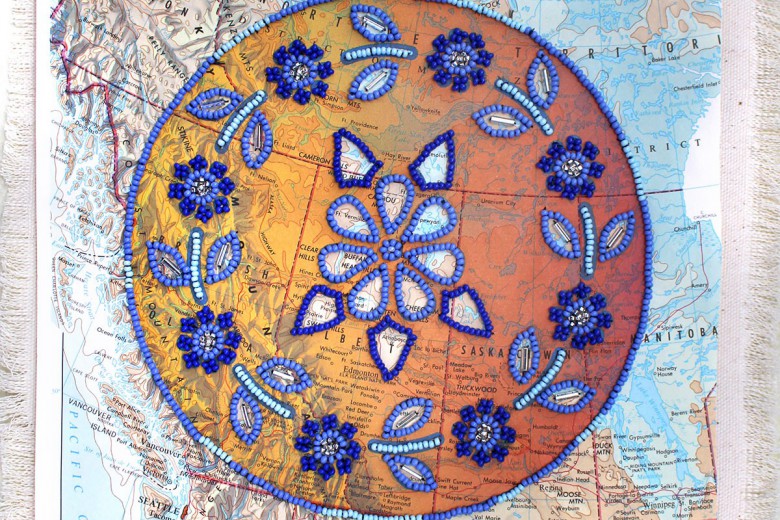When we talk about “land,” we refer to the inherent connection Indigenous bodies have to territory – we cannot separate the two. Land and Indigenous bodies are tied together; they are mirrored entities, reflecting our relationships to ceremony, language, our relations and kin, and our Indigenous technologies. The safety of our land also means the safety of our bodies. Pushing for pleasure, desire, love, and consent are ways that we reclaim our sexual sovereignty, which translates to our agency as Indigenous women, Two-Spirited, trans, and gender-variant people.
Taking a harm-reduction approach, we will address the importance of safe spaces for sex workers and people employed in the sex work industry. Sex workers have been and are on the forefront of sexual liberation, reclamation, and body sovereignty for Indigenous people.
We want to reject the idea that sex workers withdraw from traditional values and Indigenous knowledge systems, arguing instead that loving ourselves and our bodies is an important act of defiance to colonial trauma.
The dehumanization of sex workers stems from the same violence enacted on our Missing and Murdered Indigenous Women, Girls, Trans, and Two-Spirits (MMIWGT2S). The misogyny, racism, and whorephobia we experience is rooted in white supremacy, which views our bodies as disposable whether or not we do sex work. We are coded as “Other” and therefore automatically sexualized – it’s a “damned if you do, damned if you don’t” situation.
But these same misogynist, transphobic, anti–Two-Spirit, and anti–sex work frameworks have seeped into some Indigenous spaces. When we attend ceremony and Indigenous community gatherings – spaces that should be healing and positive – we are often made to feel shame and guilt. These are manipulation tactics introduced by the church to weaken our communities and are sustained through white supremacist capitalist systems. Normalizing sex work ensures our safety in society, since normalization allows us access to information on safer sex practices, reproductive rights, sexual and gender expression, consensual relationships, and more. In addition, sex work is an important source of body sovereignty and autonomy for Indigenous women and Two-Spirits. We want to reject the idea that sex workers withdraw from traditional values and Indigenous knowledge systems, arguing instead that loving ourselves and our bodies is an important act of defiance to colonial trauma.
How does returning land to Indigenous communities affect you as sex workers?
JP I believe Land Back affects every single thing we do. Being able to join spaces created and led by people who are Two-Spirit, trans, and gender-variant brings us peace and solidarity in an otherwise violent and scary world. Returning land is a way of actively correcting ongoing white supremacy, whether the land is returned by a government or by a non-Indigenous individual land “owner.”
Land Back as a concept is the acknowledgement that harm has been done to Indigenous Peoples and our kin of colour – most notably Black trans women and trans women of colour who are, and have always been, at the forefront of sex workers’ rights advocacy. Land Back as an action means creating, shaping, and/or healing physical space to best suit our needs for safety, community, and identity. Land Back would mean that every choice that Indigenous Two-Spirit people make for themselves is truly free and consensual, not based on scarcity of resources or threats of violence. We would all have easy access to the food, housing, health care, and community spaces we need to thrive and live our most authentic lives.
Land Back would mean that every choice that Indigenous Two-Spirit people make for themselves is truly free and consensual, not based on scarcity of resources or threats of violence.
AH The concept of land is intrinsically tied to the Anishinaabeg body – the land reflects our languages, our ceremonies, and our bloodlines. When we as Indigenous people are displaced from our lands – often as a result of resource extraction and always as part of a colonial attempt to assimilate and disempower us – we lose the ability to make decisions about our own lives and communities. This loss of self-determination is magnified for Indigenous Two-Spirits, trans, gender-variant people, women, and queer folks. When we connect to land, we move toward freedom to live our Indigenous truths – the strength of our communities depends on our cultural, spiritual, and physical safety. The freedom to express our sexuality and gender identity liberates us from the confines of colonial ideologies and allows us to truly love our bodies as Indigenous women and Two-Spirits. When I say “Land Back,” I mean that Indigenous people have sovereignty over their bodies and what they choose to do with their bodies. And when we centre sex workers, we establish that all Indigenous bodies are sacred.
As an Indigenous sex worker, what do you need most from your community to feel safer?
JP Safety is crucial to me in this line of work as a Métis femme. And on top of this, the reality is that many of our community members who experience more barriers to safety and opportunity in society than I do turn to sex work for a variety of reasons, like employment discrimination in corporate settings, or being unable to work elsewhere as a result of being traumatized by systemic violence. I’ve heard many times that what we need most is ceremony that isn’t framed as a tool to “save” us. What we also need is for people to stop thinking that sex work is the reason for the crisis of MMIWGT2S, that all MMIWGT2S are sex workers. Because if you look at the root of this crisis, it’s that society as a whole is taught – through the media, in schools, and by the law – that Indigenous trans people, women, and girls are disposable and not worthy of living. We deserve respect, no matter what kind of work we do. We need support from our communities to achieve that reality. Otherwise, our oppressors will have succeeded in turning us against ourselves.
Unfortunately, Christian and Victorian mentalities have seeped into our communities, introducing shame and guilt to weaken the strength of our sexual autonomy.
AH To be entirely transparent, I am not currently working within the sex work industry (though my return is likely). But when I was, I really could have used acceptance within my community and ceremony without having my work stigmatized. Depending on who is leading it, our Sweat Lodges often incorporate sharing circles and during them, I was never truly able to be honest about my life. I still have a hard time with it as a pole dancer and performer. I wish narratives around sexual expression weren’t discouraged during ceremony, when sexual expression is such a normal part of our lives as Indigenous people. Unfortunately, Christian and Victorian mentalities have seeped into our communities, introducing shame and guilt to weaken the strength of our sexual autonomy.
How has participating in the sex work industry affected your perceptions of safety in spaces?
JP Sex work has shown me how we as Indigenous women get short-changed (literally) all the time: we’re expected to be matriarchs, maids, cooks, academics, social workers, change-makers, and protectors. We are taught to have zero boundaries, especially around love and sex, I find. I finally learned the meaning of “‘No’ is a full sentence” when doing sex work. Sex work has also taught me how important it is to have our own spaces so that we can recharge and just be ourselves for and with ourselves. In my experience, and based on my conversations with other Indigenous Two-Spirit people and women in my life, not having opportunities to reconnect with ourselves re-creates trauma, isolation, and shame. Recharging can happen through medicine picking, being in ceremony, visiting with our community, and more. But there is a huge lack of adequate support and resources, which is why ceremony that is accepting of all of us is crucial to our collective well-being. Sex work has also taught me how important it is for Indigenous and Black communities to stand in solidarity with one another. In general, though, I always felt unsafe before doing sex work, and I still do. That is simply the unacceptable and heartbreaking reality of being an Indigenous Two-Spirit person in so-called Canada.
We are taught to have zero boundaries, especially around love and sex, I find. I finally learned the meaning of “‘No’ is a full sentence” when doing sex work.
AH Sex work has certainly opened my eyes in terms of the overwhelming and disproportionate incarceration and criminalization rates of Indigenous women and Two-Spirits (as well as Black and POC sex workers). I believe this perpetuates society’s belief that it’s acceptable to not only over-police Black and brown bodies but to also enact violence on them. It’s a scary world out there. Doing sex work has made me a stronger person by granting me permission to establish boundaries for my own agency and safety. It is then up to others to honour those boundaries and respect my work and how I treat my body.
What are some of the issues within the colonized model of sex work industries?
JP Currently, strip clubs are most often dedicated to straight men with lots of money, and strippers there are forced to adhere to white supremacist standards of beauty (being cisgender, thin, white, and conventionally attractive). Also, customers often assume they can ask or do whatever they want to me once they learn I’m Métis, which is not okay. As workers, we have few to no rights: cops, club managers, and customers all abuse their power over us workers because they know the law isn’t on our side. There are so many confusing legal loopholes and contradictions that can be hard to navigate when you don’t have the language or knowledge of how the colonial legal system works. Then, on top of that, people tend to assume we don’t deserve being treated like human beings.
This makes me think of the common argument that sex work is a colonial concept and that participating in it means you are inherently anti-Indigenous because our ancestors supposedly never did it. Well, I have news for you: our ancestors also never used toaster ovens, but here we are.
AH I often think about my choice to pursue sex work as a way to make ends meet. At the time, I was doing my second undergraduate degree, working two part-time jobs while also doing an unpaid internship at a gallery (which was a requirement for my program). I remember that I simply could not pay rent or my bills and, honestly, a job is a job. People often function under this binary mentality that they are either “for” or “against” sex work without discussing the complexities of lived experiences. This makes me think of the common argument that sex work is a colonial concept and that participating in it means you are inherently anti-Indigenous because our ancestors supposedly never did it. Well, I have news for you: our ancestors also never used toaster ovens, but here we are. I’m tired of this colonial trope that we are stagnant people – unchanging and stuck in a static past. The beauty of the Anishinaabeg is that we are always evolving and fluidly in motion – adapting to our world while staying grounded in our Anishinaabe ways of being.
How does reclaiming our bodies – through gender, sexuality, sex, pleasure, and consent – relate to Land Back?
JP Our bodies are one with the land; this is just how life has been taught to me and how I experience it as a Two-Spirit Métis person. This means that when there is destruction and harm done to the land, we feel it too. On the flip side, when I and others engage with the land in play and peace, we’re able to feel those same things as well. As a Métis Two-Spirit femme, I’ve also been taught my whole life that I as a woman exist to give service to others at my own expense. That means when I engage in consensual sex, when I experience pleasure, when I express my gender and sexuality, I’m rejecting white supremacist ideas of who and what I am supposed to be. Land Back offers a space where I can fully assert those things about myself with freedom and confidence and that others can do the same, too.
That means when I engage in consensual sex, when I experience pleasure, when I express my gender and sexuality, I’m rejecting white supremacist ideas of who and what I am supposed to be.
AH I constantly revisit Leanne Betasamosake Simpson’s discussion on an Anishinaabe concept called Biskaabiiyang, which is a verb used to describe returning to ourselves, spiritually and physically. The fight to reclaim our bodies as Indigenous Two-Spirits and women defines our own physical self-determination – and no one else’s. That means we can use contraception, we can terminate a pregnancy (I have stories of my ancestors using medicines to do this, so don’t @ me), we can have consensual sex with whomever we like, we can dictate our own weight, we can pleasure ourselves, and we can express our gender identity however we goddamn want. Returning to ourselves inherently means loving the bodies that our ancestors gave us.
This story was financially supported by a bursary from the Journalists for Human Rights’ Indigenous Reporters Program.


